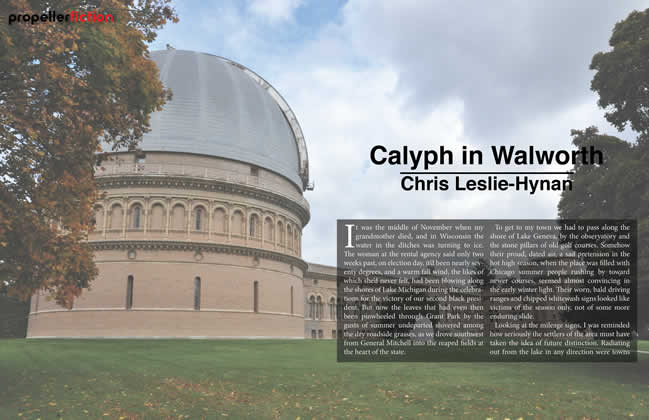
The following excerpt is from a novel about a man who lies about his past to get a job as a chauffeur for a professional basketball player. He becomes obsessed with the player, Calyph West, and in the process of making himself necessary more or less wrecks Calyph's life. Here they've flown to the funeral of the narrator's grandmother, where the narrator's true origins are revealed.
It was the middle of November when my grandmother died, and in Wisconsin the water in the ditches was turning to ice. The woman at the rental agency said only two weeks past, on election day, it'd been nearly seventy degrees, and a warm fall wind, the likes of which she'd never felt, had been blowing along the shores of Lake Michigan during the celebrations for the victory of our second black president. But now the leaves that had even then been pinwheeled through Grant Park by the gusts of summer undeparted shivered among the dry roadside grasses, as we drove southwest from General Mitchell into the reaped fields at the heart of the state.
To get to my town we had to pass along the shore of Lake Geneva, by the observatory and the stone pillars of old golf courses. Somehow their proud, dated air, a sad pretension in the hot high season, when the place was filled with Chicago summer people rushing by toward newer courses, seemed almost convincing in the early winter light. Their worn, bald driving ranges and chipped whitewash signs looked like victims of the season only, not of some more enduring slide.
Looking at the mileage signs, I was reminded how seriously the settlers of the area must have taken the idea of future distinction. Radiating out from the lake in any direction were towns with names like Waterford and Brighton and Avalon, and even Harvard, Illinois. That these names of borrowed noblesse lay just down a county road from towns like Abells Corners and Mukwonago, and the obliviously-named Bong State Recreation Area, gave the region its character and made me feel I was almost home. In college I remember telling people that I was from near Lake Geneva, and then adding "the American Lake Geneva" if they seemed confused.
We came up on Fontana, and old brick houses with white shutters pinned back peered out at us from the shore of the lake through thin, denuded trees.
"Any of those your peoples?" Calyph asked. I think he was getting impatient for the appearance of something that fit in with the rich forgeries of my past.
I shook my head. "I might've caddied for someone," I ventured. "They’re probably dead now"
He looked into an open garage as we passed, as though expecting to see the body of an old man lain out on the oil-stained concrete.
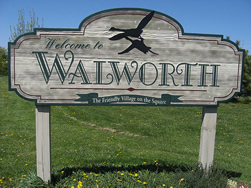 A little while after, we came finally into Walworth. With its six-by-six grid, we were halfway through before we were there at all.
A little while after, we came finally into Walworth. With its six-by-six grid, we were halfway through before we were there at all.
"This is it," I said. "Go left at the light."
"Walworth," he said. "Like the store?"
"We aren't store people."
When I guided him onto our street, I saw our fall come to life for Calyph in the rusted frames and sagging bumpers of every old Buick on the block. In the yard of a house with a different Packers flag in each of its basement windows, a mastiff was butting a broken Hot Wheels around in circles in the driveway as a kid sat watching primly from a still trike.
My Aunt's house is at the end of a gravel lane, with an old orchard on one side, and its thin trees looked just gnarled and ghostly enough that it might've still been possible for Calyph to believe that some resplendent ruin awaited us. Even though I wanted him to know the truth now, as we passed along the orchard so long fallow I never knew its fruit, I felt a last surge of love for the ruined things I'd made, and had a fleeting, wistful vision of what a terrific sort of mouldering estate-house I would have had him driving us to in the great northern gothic of my imagined life.
But it was just a clean little brown house, and the only thing rusting was the basketball pole. Even it was less rusted than I remembered; my Uncle must have touched it up.
Calyph turned the engine off and we sat for a bit in silence.
"So this is how you fall," he said neutrally.
"Don’t ask them about that," I said. "They won’t know what you’re talking about."
He gave me a wary look, but I opened my door and looked away. I didn't want to rehash what was already the best explanation I could give him. Just then my Aunt came around the side of the house, wearing a kerchief and a loud fall jacket.
"I was just doing some raking," she said brusquely, extending Calyph a small, work-softened hand. "I’m Rose Lauren." When he gave his name she nodded shortly, and repeated it back to him without a hitch. We went inside, and as she held the door for Calyph she didn’t even scrutinize him. She took him so much in stride I wondered if she was paying attention.
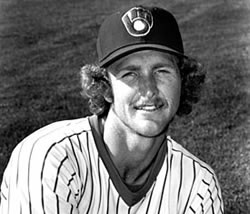 My Aunt's is a small-roomed, leathery house, brown inside and out, and of course I was looking at it through Calyph's eyes. The kitchen used to always smell like dry cat food, but that was gone now, though the cats still remained, lazing on chairs and warming the place. We went from room to room and had a little tour. In the living room Calyph bent to look at the framed picture of my uncle with Robin Yount, and one of the cats leapt across the room to collapse on his foot. He lifted the little thing with one hand and set it backwards over his shoulder with an abstracted air. When we went into my old room and I saw my Aunt had returned it to its childhood condition, old basketball posters and all, I could only stare into the cat's depthless eyes in mortification.
My Aunt's is a small-roomed, leathery house, brown inside and out, and of course I was looking at it through Calyph's eyes. The kitchen used to always smell like dry cat food, but that was gone now, though the cats still remained, lazing on chairs and warming the place. We went from room to room and had a little tour. In the living room Calyph bent to look at the framed picture of my uncle with Robin Yount, and one of the cats leapt across the room to collapse on his foot. He lifted the little thing with one hand and set it backwards over his shoulder with an abstracted air. When we went into my old room and I saw my Aunt had returned it to its childhood condition, old basketball posters and all, I could only stare into the cat's depthless eyes in mortification.
"J.R. Rider, huh? Wassup, Sheed," Calyph said to the wall.
"You shouldn’t have, Rose,”" I said, and she and Calyph turned to one another and laughed.
"Have you lived here long?" he asked her.
"I've lived here all my life," she said.
AS WE STOOD outside after the funeral, preparing to make the processional, the first breaks in the family formality appeared. People shook hands in a relieved way, and I felt that mingled sense of warmth and danger from being among people who might be reverting to their natural selves. My Uncle Ron, who is not an Uncle at all, was the first to come over. He'd been among the pallbearers, and seemed enlivened by the physical task.
"Honored to have you," he said, shaking both our hands. He asked where I'd been living, and repeated "all the way from Orry-gone" twice in an impressed voice.
"Have I seen you before, sir?" he asked Calyph. "Did you go to Carolina?"
"I did."
"I thought so. I'm a Badger man, and you gave it to us pretty good in the tournament a few years back."
"I guess we did," Calyph said.
"Even Krakkenhofer couldn't guard you. Devin Harris, though—what a player he was! Did you know he's in the NBA now?"
"Is he."
"New Jersey Nets! What are you doing these days?" Uncle Ron's face shone with the relish of this questioning, and he put his hand on the crown of his houndstooth hat, as though to protect it from a stray gust.
"Just trying to get my knee right."
"Well, you’ll always have the college days," my Uncle said loudly. Tamping down his hat in a sort of bow, he turned suddenly away.
By the time we'd settled around the grave site, my family looked familiar at last. With their dark suits and restrained, formalized manners, they could have been almost anyone—even who I said they were. But it was a cold afternoon, and the topcoats had got buried beneath the parkas, and the severe coiffure beneath ragged knit hats. One of my great-uncles shivered defiantly in his funeral wear until he was taken aside and induced to pull an ancient green Bucks headband out of his pocket with trembling hands. When he put it on he looked a fitting patriarch, and although I could read nothing from Calyph's face I think it was clear we'd never been heirs to anything but spirit and dirt.
AFTER THE funeral, we went back to my Aunt's for a meal. There was a honey ham and there were meatballs with grape jelly and brandy Old Fashioneds, and since the meal was eaten in the afternoon it felt as though it were a holiday, an informal one where the uncles were allowed to bring a can of beer to the table. Afterward there were even presents. It was the birthday of a thin, black-haired boy who might have been a distant cousin and who liked to lift up his shirt and suck in his stomach until his ribs bulged out.
"Not at the table, Travis, God," his mother said.
"I’m from the Sudan," the boy said proudly. He was just young enough not to be punished for this in public and probably he knew it.
"Travis is five today," his mother said, directing a shamed look halfway down the spread, near Calyph's plate. "He doesn’t know better."
"I’m six," Travis said.
"He’s five," his mother repeated desperately. "If he was six we’d have to shoot him."
Then the presents were over, and people were slipping away. As the grid of cars that filled the drive loosened, we heard a light rhythmic thudding from outside, interspersed every few seconds with a heavier sound.
The sound brought Travis's head up from where he'd been dragging the edges of his plate for cake frosting. "I want to play," he said, to no one in particular, and then his empty chair was rocking slightly side-to-side and his mother was calling without confidence for him to come back.
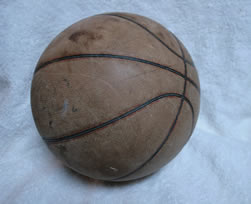 Outside a couple of neighborhood boys were shooting at the rim with an old ball, and Travis was hounding them and chasing the rebounds. When Calyph followed me out, they all just stopped. Even the birthday boy stood awed. It was as though Calyph had only now become a six-nine black man who wore a gravely resplendent suit and whose hands moved too quickly even when he was doing something so minute as reaching for his napkin.
Outside a couple of neighborhood boys were shooting at the rim with an old ball, and Travis was hounding them and chasing the rebounds. When Calyph followed me out, they all just stopped. Even the birthday boy stood awed. It was as though Calyph had only now become a six-nine black man who wore a gravely resplendent suit and whose hands moved too quickly even when he was doing something so minute as reaching for his napkin.
One of the boys shot a self-conscious airball and they all ran after it ravenously. Someone snatched it up, and passed it to Calyph. He turned it in his hands, feeling the worn grain, then passed it softly back.
Immediately it came back to him.
"Can you dunk?" one of the boys asked.
"Look at his leg," his friend whispered loudly. "It’s messed up."
"Shoot," Travis urged. "Shoot."
Calyph looked down at the ball. Time had smoothed it and drained it of its color, and the leather was peeling a little in places. It was the kind of ball that looked like it ought to have been held by a man in spectacles and tiny shorts in a black and white photograph.
He lifted the ball for a second, and gave a grimace of a smile. Then he put it down again against his hip. The kids were staring at him, waiting. We all waited, to see if he would shoot. I looked into his face and saw that his eyes were narrow and inward-seeing. What if he missed? I think we all considered the ball's spinning, soundless drop through the tattered net an inevitable conclusion. But he was injured, and though his new contract was still good, he could be traded any day to a team that might try to get him to retire for cap relief; at any time his place might be taken by younger men who smiled benignly for the fans and made no trouble, and who might in a single game declare a talent that would render his second-rate and expendable. And if he did miss, who knew the judgment that would come from my skeletal cousin from the Sudan?
Finally he lifted the ball. Then he put his other arm over his face, covering his eyes with the crook of his elbow. Careless and blind he heaved the thing like a baseball toward the backboard. It hit with a tremendous crash, slipped through the net on the carom, and hit my cousin on the side of the head. Instantly he began to cry.
Calyph swore exultantly. "You ain't hurt!" he called down, laughing.
He took my shoulder and lowered his voice to a whisper. It seemed a needless intimacy, and once more I was thrilled and terrified. "Clean this up for me, Jeeves, for once in your life," he said softly, and turned and went into the house.
I went over to Travis and put my hand awkwardly around his shoulders, pretending to examine him. Sure enough, as soon as Calyph was gone he stopped crying and his eyes took on a sly look.
"Tell on him," he urged. "Tell them he hurt me."
"Wasn't that fun?"
"That guy's mean. I'll never speak to one again."
"You might have to," I said.
"No," he told me definitely. "They're just for television. They're cool on television. In real life they're dicks."
I nodded at him sagely, for I could see that this too was a put-on, that he was after all glad to be hit and so to be the center of things once more. I think he'd even leaned into the path of the ball a little.
I felt him turning in my grasp, the young life of him straining to be free. "I never want to meet another one," he said fiercely.
"You will," I said, and when I did it seemed, for the first time, the voicing of a slightly tired feeling that would soon run its course, and then I let my cousin go, and watched him run off through the freezing grass to tell the story to everyone. Ω
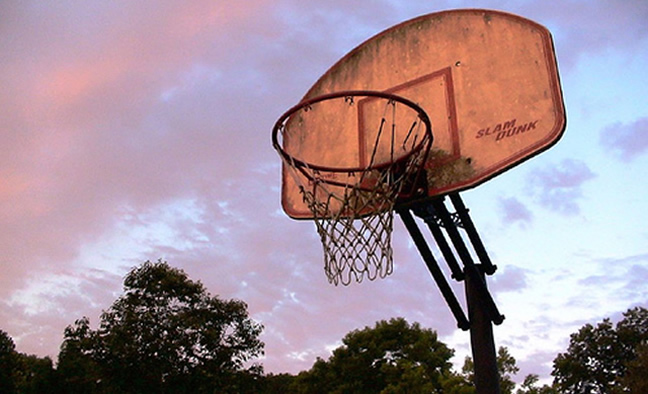
Chris Leslie-Hynan is a graduate of the Iowa Writers Workshop and lives in Portland, Oregon.


